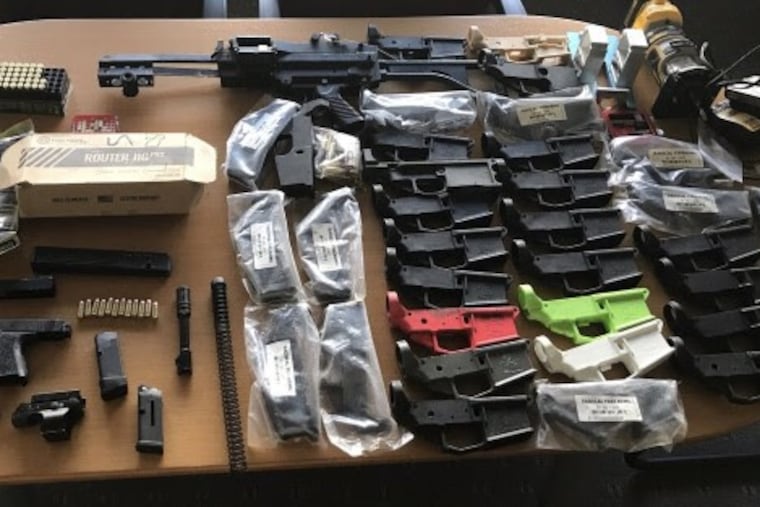Philadelphia man manufactured ghost guns, including AR-15s, inside his Kensington home, prosecutors say
Prosecutors said Luis Soto ordered dozens of gun parts online, then used a drill press to assemble untraceable automatic weapons and handguns.

A Philadelphia man was operating a gun-manufacturing facility inside his Kensington home, prosecutors said Tuesday, in what officials said is another example of how the largely unregulated and untraceable ghost guns continue to infiltrate the city.
Luis Soto, 29, was arrested last week and charged with 11 counts of felony illegal gun possession, criminal use of a communication facility, and related crimes after city and state law enforcement agents discovered he had been illegally assembling and selling the guns.
Prosecutors said Soto ordered dozens of gun parts online, then used a drill press to make the necessary holes in the metal and plastic parts, before assembling the weapons — a process that took less than 30 minutes.
Because the weapons were assembled using individual parts, they are considered ghost guns, which have no serial numbers and are largely untraceable by law enforcement. There are no federal restrictions on who can buy ghost gun kits or parts.
Soto was manufacturing the weapons inside his home on the 1900 block of East Tioga Street in the Harrowgate section of Kensington, an area facing some of the highest rates of gun violence, largely driven by the open-air drug market.
» READ MORE: What are 'ghost guns'? And are they legal in Pennsylvania?
Officials could not estimate how many weapons Soto assembled and sold, or how long he had been running the operation. But inside the home, police recovered a slew of items, including a recently assembled handgun, dozens of gun parts for handguns and AR-15s, an incomplete AR-15, and boxes of ammunition, said William Fritze, head of the Gun Trace Task Force in the District Attorney’s Office.
At a news conference Tuesday, Fritze said it was one of the largest weapons-manufacturing arrests his office has seen.
Soto, who has five felony burglary convictions, is prohibited from owning or assembling firearms. But because there are no federal regulations on who can buy ghost gun kits or parts, he was able to order the parts online without incident — something that gun safety advocates have long said is a loophole that undermines public safety.
“This is the problem we’re seeing again and again, with ghost guns getting into the hands of felons,” Fritze said. “There is no way for us to even know how many firearms Mr. Soto put out on the street before we were able to stop it.”
Philadelphia police have said they’ve seen a stark uptick in the number of ghost guns recovered in crimes. In 2018, police recovered just 12 ghost guns, but in 2022, that number jumped to 575 — a more than 4,600% increase.
That mirrors a national trend. A recent ATF report found that ghost gun recoveries increased 1,000% between 2016 and 2021.
Last year, officials arrested a Philadelphia man for using a 3-D printer to build, assemble, and sell ghost guns.
Firearms are typically manufactured by licensed companies and are required to have serial numbers, which officials use to trace the guns back to the manufacturer, the firearms dealer, and purchaser.
Ghost guns, though, are often sold in DIY-style kits at gun shows or online. They are typically made with what is known as an 80% frame or receiver, which acts as a base that holds all the parts of a functioning gun, like the trigger. Federal law does not consider unfinished frames and receivers to be firearms, so background checks are not required to buy the pieces.
Groups like the National Rifle Association and the National Shooting Sports Foundation have long emphasized that building a gun at home has always been legal, and that the problem is not the guns but the people who use them in crimes.
Last year, the White House announced new regulations requiring sellers to put serial numbers on the pieces sold in the assembly kits. The sale of individual parts, though, do not fall under that regulation.
In Soto’s case, prosecutors said he was ordering the individual parts online under an alias. Officials could not comment on whether he was acting alone, though no one else has been charged.
Soto was held on $875,000 bail, and remains in custody at the county correctional facility. At the time of his arrest, he was wanted on a bench warrant for violating probation in an earlier burglary case.
He was last arrested in 2013 on multiple burglary charges. He was sentenced to up to three years in jail, and three years’ probation.
Soto’s lawyer from the Philadelphia Defender Association declined to comment.